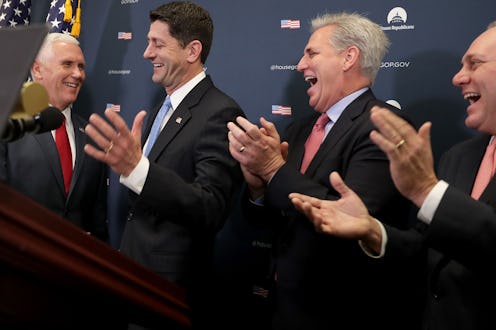News
The AHCA Is Much Different From Obamacare

On Monday, House Republicans released their highly-anticipated plan to replace Obamacare. It's only a draft bill, and it will almost certainly undergo many changes before coming anywhere close to a vote. Nevertheless, it offers the clearest picture yet of how Republicans — or, to be more precise, the GOP's congressional leaders — envision health care in a post-Obamacare world. So, how is the Obamacare replacement bill different from Obamacare?
It's very, very different. The GOP plan would eliminate most of the Affordable Care Act's central provisions, specifically those that expand coverage for low-income Americans. It would also defund Planned Parenthood, sharply reduce abortion access for low-income women, and eliminate the law's individual and employer mandates. Although it's impossible to project too much from what Republicans released today, it would almost certainly result in millions of people losing their health insurance.
First, the legislation would phase out Obamacare's Medicaid expansion, which currently provides insurance to millions of low-income Americans. Those who are eligible for Medicaid under the expansion would still be allowed to enroll until 2020, at which point it would be closed off to new enrollees. Additionally, the GOP proposal would shrink Medicaid in general by limiting federal funding for the program, effectively placing a cap on how many people in each state are allowed to enroll in it.
The Republican plan would completely eliminate the subsidies Obamacare offers low-income Americans for use in purchasing health insurance. In place, it would offer tax credits that, while partially taking into account a person's income, would mostly be based on their age. This is a dizzyingly complex topic, and Vox has a great in-depth analyses of how the new tax credits would work. In short, though, this restructuring of tax credits would most likely benefit younger, healthier Americans while leading to premium increases for older, sicker people.
Next, the bill would defund Planned Parenthood. This phrasing is a bit deceptive, however: Although Planned Parenthood currently receives around $528 million in public funding every year, it's not as though the government just writes a check to the organization. No, this funding comes in form of Medicaid reimbursements: Medicaid enrollees go to Planned Parenthood, and the government reimburses Planned Parenthood for the cost of whatever service they provided. But under the GOP plan, Planned Parenthood would no longer be eligible to receive those reimbursements. Because Medicaid is a program for low-income Americans, this change would hit low-income women the hardest.
Relatedly, the Republican legislation would incentivize private insurers to stop covering abortion altogether, as it would prohibit tax credits from being used to purchase insurance plans that cover abortion. This would essentially make plans that do cover abortion more expensive for consumers, which in turn would be a disincentive for insurers to offer abortion-inclusive plans at all.
The law would repeal the individual mandate, which charges Americans above a certain income who opt not to buy health insurance. However, it would replace this with a tax penalty on consumers who have a lapse in insurance coverage at any point. The Republican plan would also eliminate the employer mandate, which requires employers to offer health plans to their workers.
Those are the big changes, but there are plenty more. For instance, the law would eliminate the minimum coverage provisions of Obamacare; this means that, for instance, insurers would no longer be required to cover maternity care and preventative care in their plans. It would also repeal the law's taxes, some of which haven't yet gone into effect.
Now, having said all of that, this bill is a long way from becoming law. It will need to be debated by the House, which will likely make changes to it; then, it will need to pass the House. But that's only half the battle: The legislation also needs to pass the Senate, which generally moves at an even slower pace than the House. But unless the Senate and House pass identical bills (which probably won't happen), they'll then have to talk amongst themselves and craft a compromise legislation that can pass both chambers. Once it does, it will land on President Trump's desk, at which point he'll decide whether or not to sign it.
Will all of this happen? It's not a sure bet. There are massive, massive divides within the GOP about how to go about replacing Obamacare, specifically with regard to the Medicaid expansion. Four Republican Senators say they'll oppose any drastic cuts to the expansion, which could imperil the entire repeal effort; meanwhile, some House Republicans oppose the repeal bill because they don't think it goes far enough. Furthermore, Trump himself has explicitly opposed cutting Medicaid, which the Republican bill does, and says that he wants to provide "insurance for everybody," which the Republican bill doesn't do.
We now have an idea of what the basic structure of a Republican health care proposal would look like. But that proposal isn't yet anywhere close to becoming law.